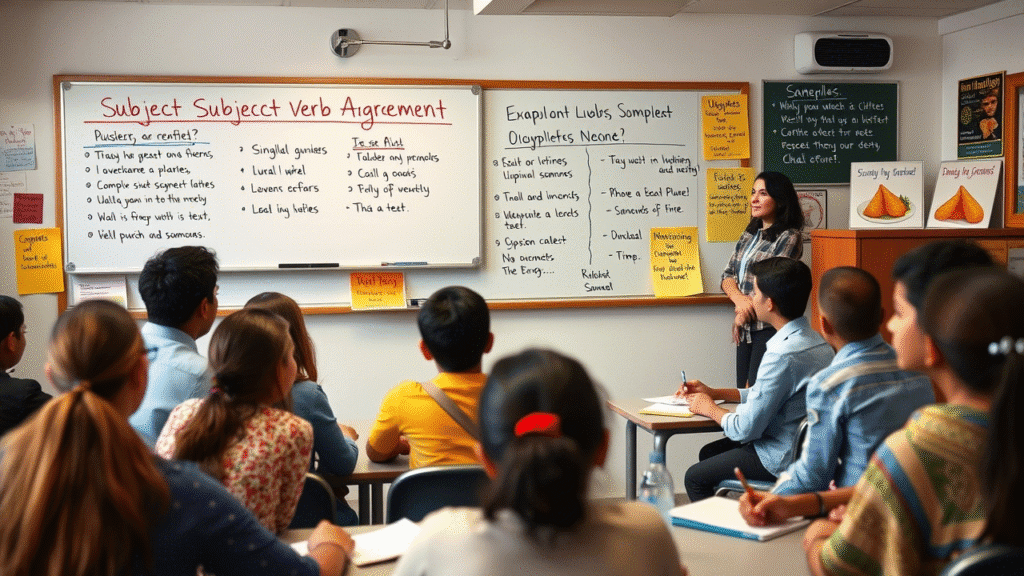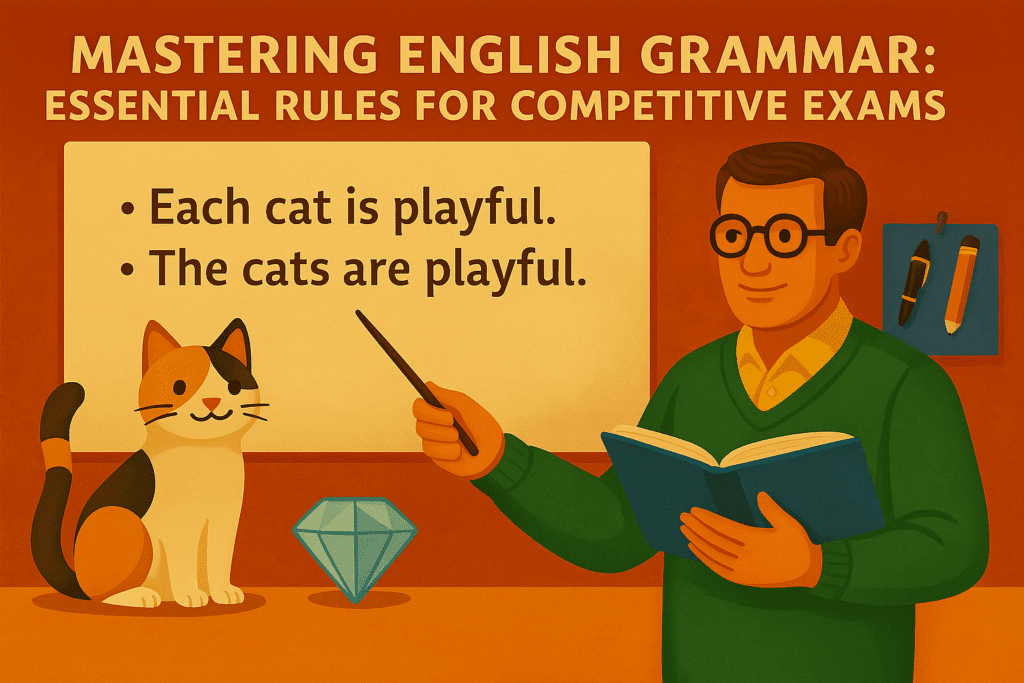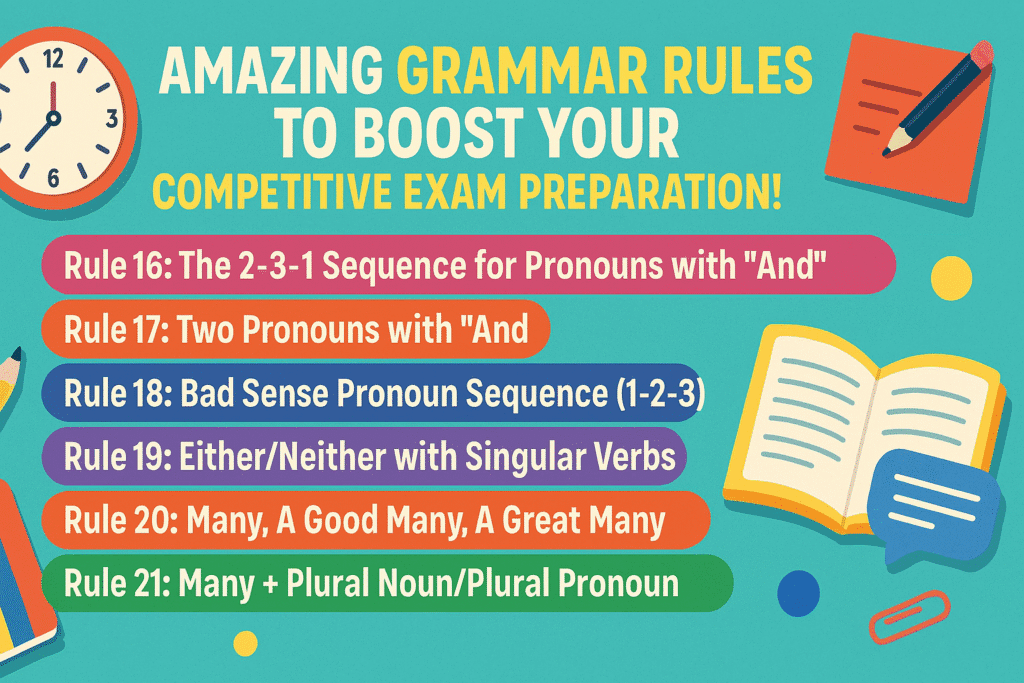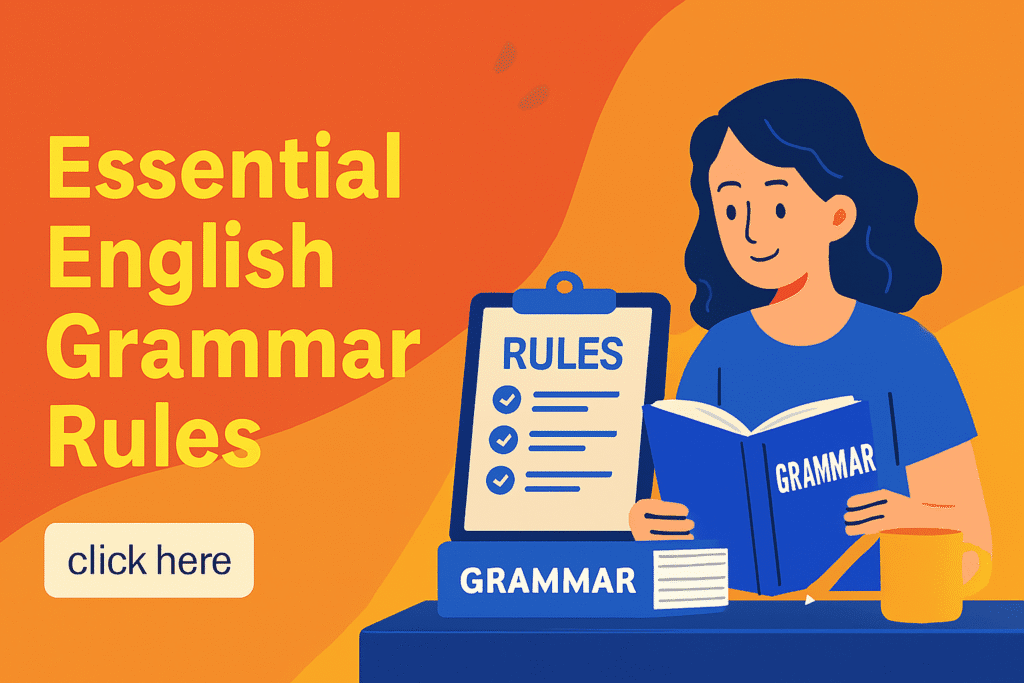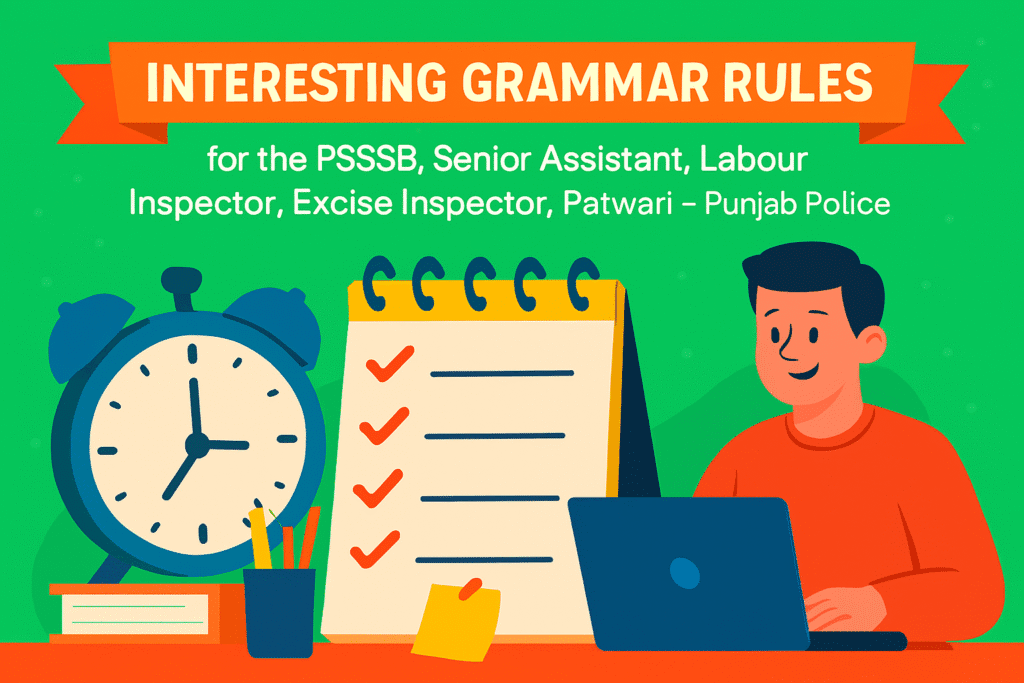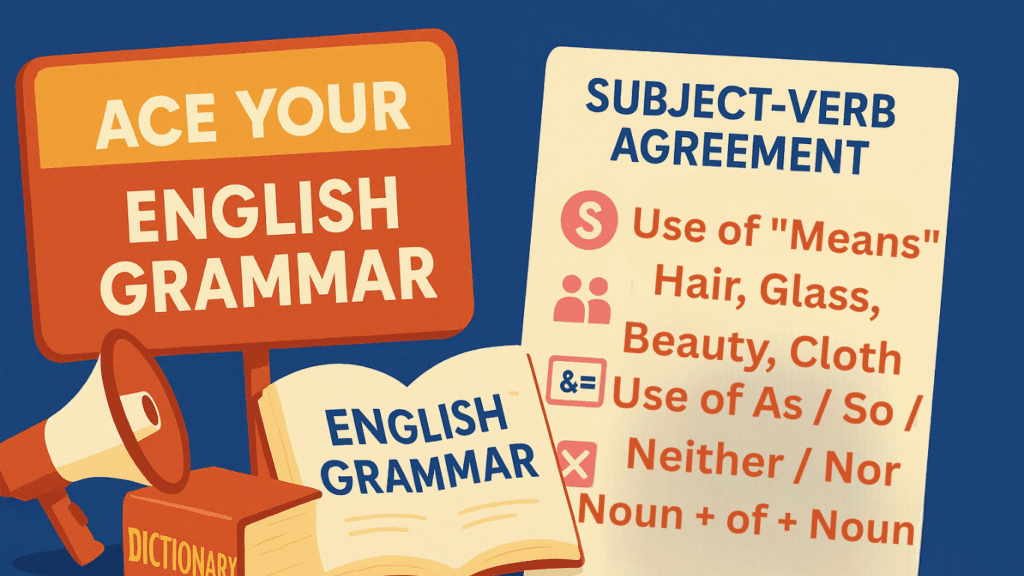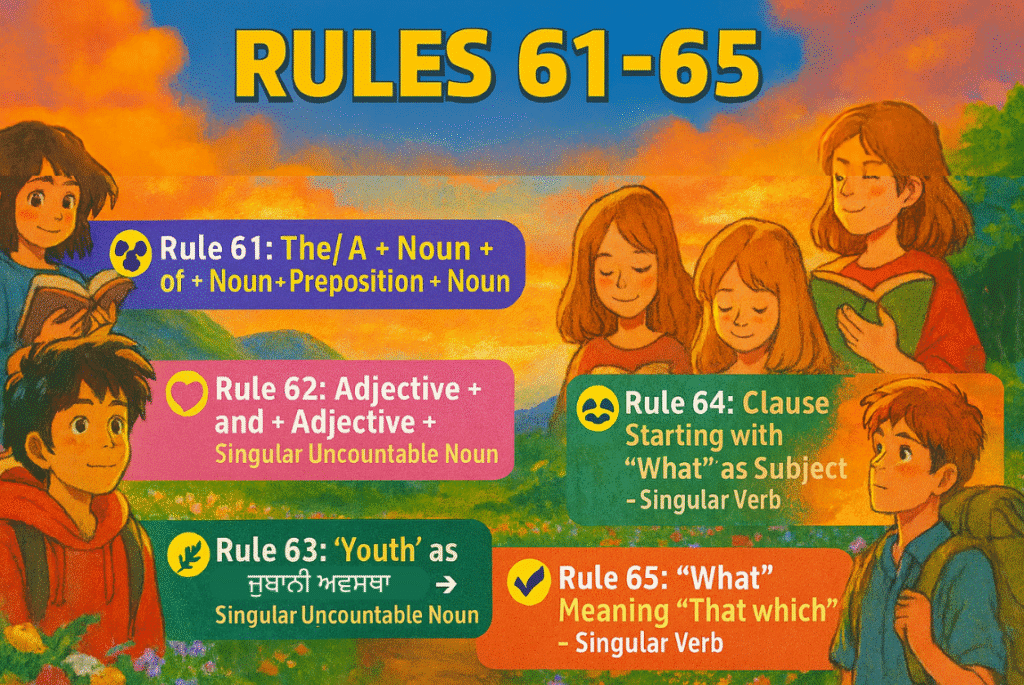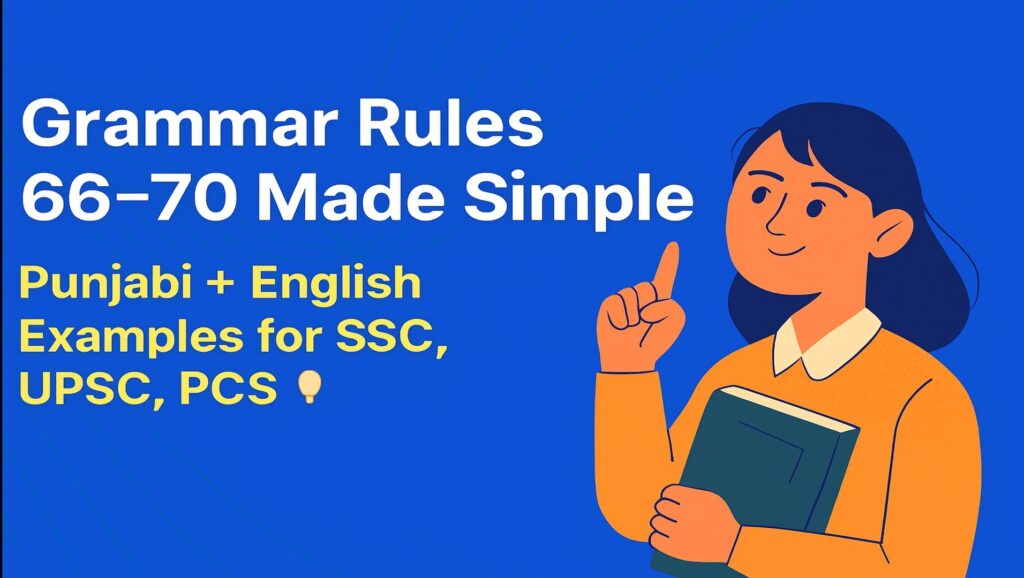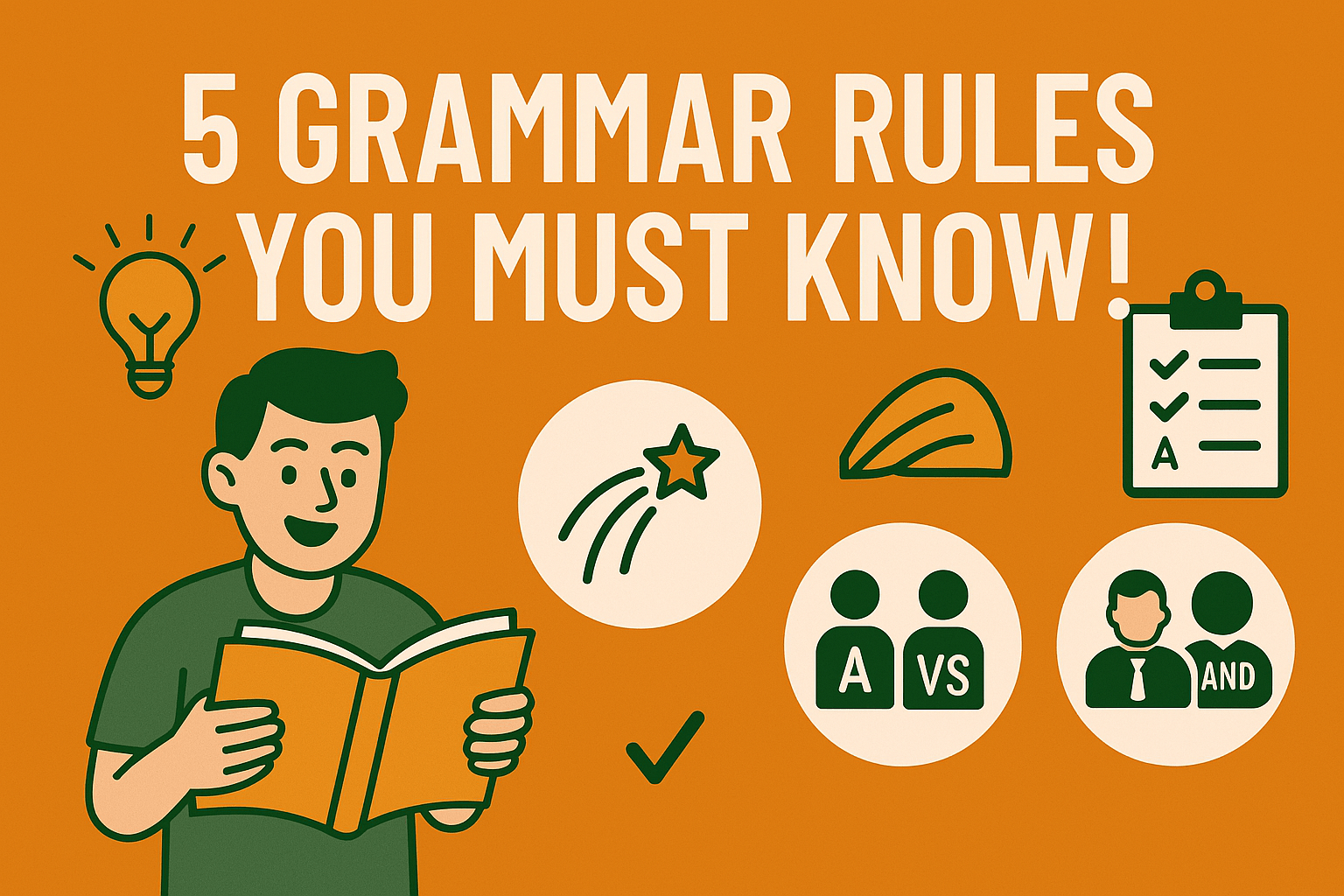
Table of Contents
Are you tired of losing marks in English grammar? Do Subject-Verb Agreement rules haunt you in your dreams? Worry no more! Today, we are diving into 5 must-know grammar rules that will not only make you an expert but also help you crack PSSSB, PCS, Punjab Police, Punjab Patwari, and other competitive exams. And hey, we’ll keep it fun and light because, let’s be honest, grammar can sometimes feel like a horror movie. So, fasten your seatbelts, grammar warriors!
Rule 1: Optative Sentences grammar rules Use Plural Verbs Even with Singular Subjects
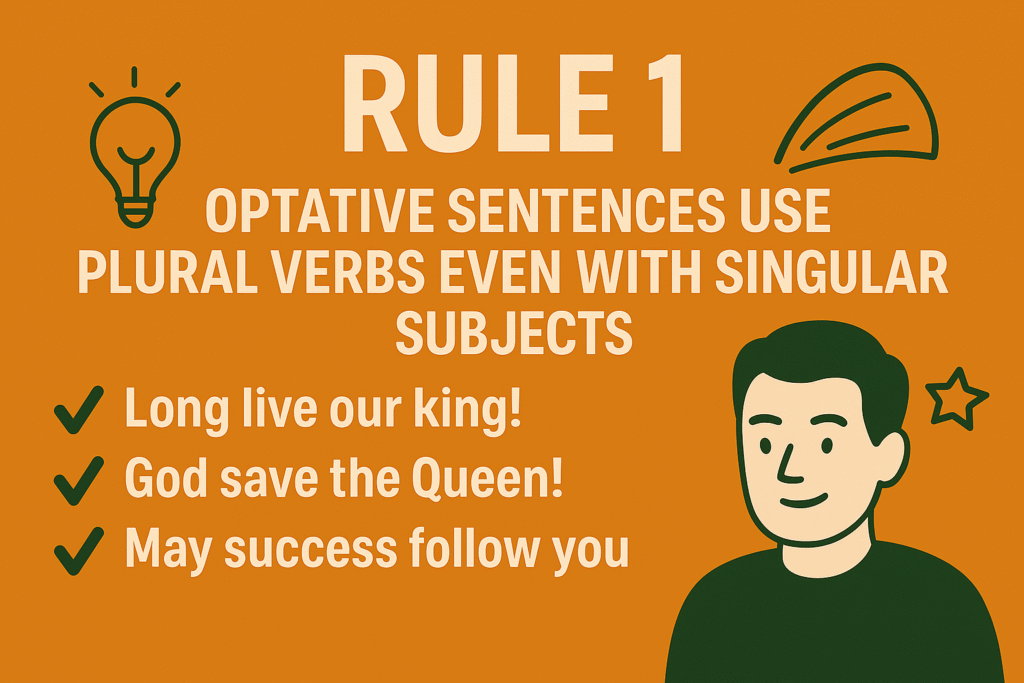
Optative sentences express wishes, prayers, or blessings. The fun part? Even if the subject is singular, we use a plural verb.
Examples:
- Long live our king! ✅
- God save the Queen! ✅
- May success follow you! ✅
Why does this happen?
Optative sentences often imply a hidden “may” at the beginning. Even if it’s not written, it’s understood, which is why the verb remains plural.
Pro Tip: Sometimes, “may” is missing in optative sentences, but you have to understand it is there. (Just like your hidden crush—always there but never seen!)
More Examples for Clarity:
May all your dreams come true! ✅
May the students succeed in their exams! ✅
May happiness fill your life! ✅
Rule 2: When Two Singular Nouns are Joined by ‘And,’ Use a Plural Verb
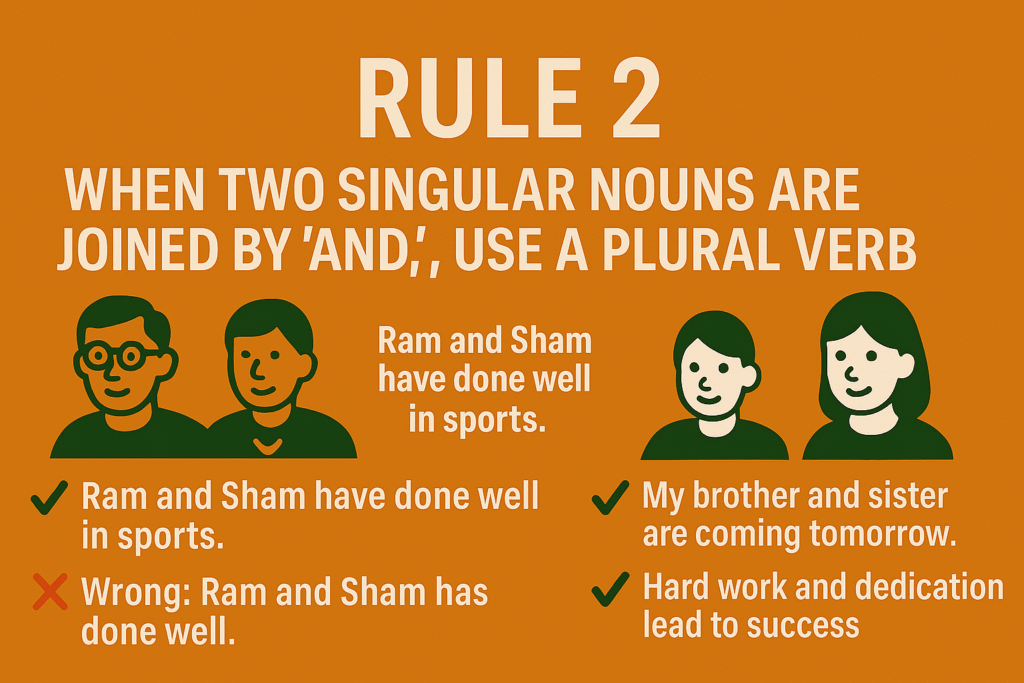
If two singular nouns are joined by ‘and’ and act as the subject, use a plural verb. This is another crucial grammar rule to remember!
Examples:
- Ram and Sham have done well in sports. ✅
- A boy and a girl love each other. ✅
❌ Wrong: Ram and Sham has done well.
🚀 Quick Tip: If the two nouns refer to a single entity (e.g., “bread and butter”), use a singular verb instead!
More Examples:
- My brother and sister are coming tomorrow. ✅
- Hard work and dedication lead to success. ✅
🛑 Exception: If two nouns represent a single idea or entity, use a singular verb.
Rice and curry is a popular dish. ✅
Bread and butter is my favorite breakfast. ✅
Rule 3: Some Pair Words Take Singular Verbs
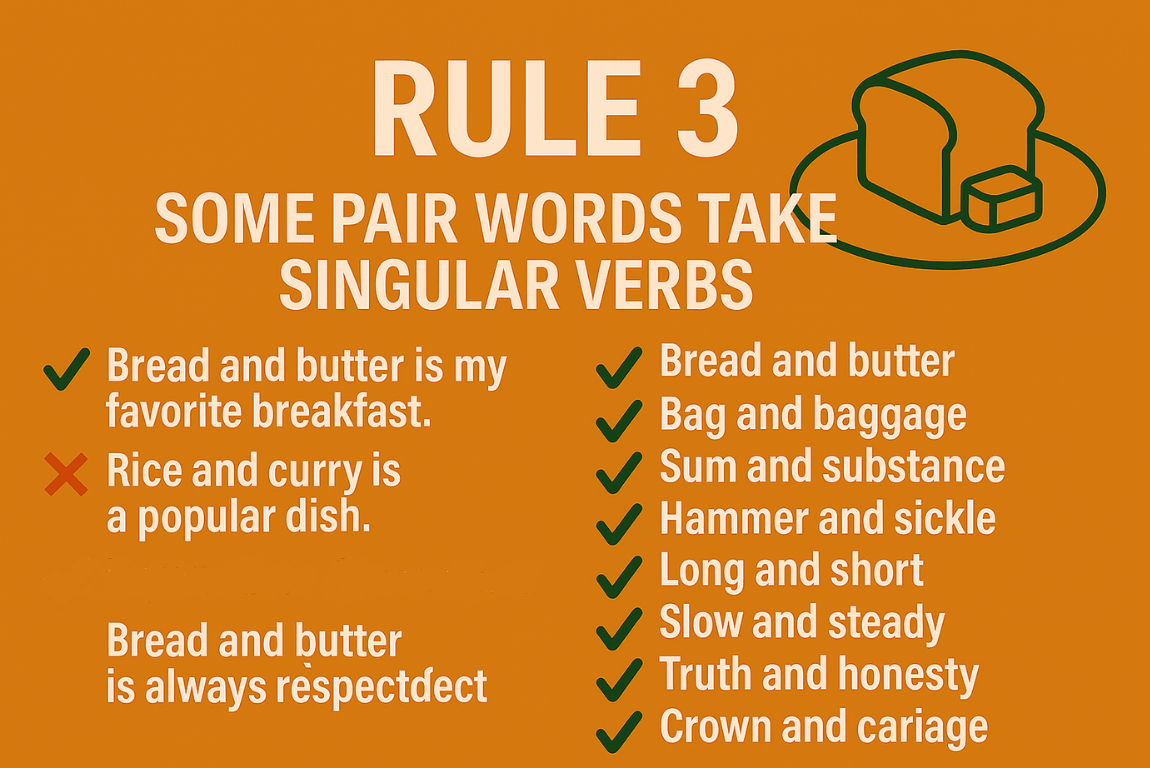
Certain word pairs act as a single unit and take singular verbs. These are unique grammar rules that you must master.
✔️ Bread and butter ✔️ Bag and baggage ✔️ Rice and curry ✔️ Sum and substance ✔️ Hammer and sickle ✔️ Long and short ✔️ Slow and steady ✔️ Truth and honesty ✔️ Horse and carriage ✔️ Crown and glory ✔️ Rise and fall ✔️ Coming and going ✔️ Screaming and shouting ✔️ Age and experience
Examples:
- Bread and butter is my favorite breakfast. ✅
- Rice and curry is a popular dish. ✅
❌ Wrong: Rice and curry are a popular dish.
🛑 Exception: When such words represent different things, use a plural verb.
- Gold and silver are precious metals. ✅
- Time and tide wait for no one. ✅
More Examples for Clarity:
- Slow and steady wins the race. ✅
- Truth and honesty is always respected. ✅
Mastering these grammar rules will help you avoid common mistakes in exams.
Rule 4: When One Person Has Two Titles, Use a Singular Verb
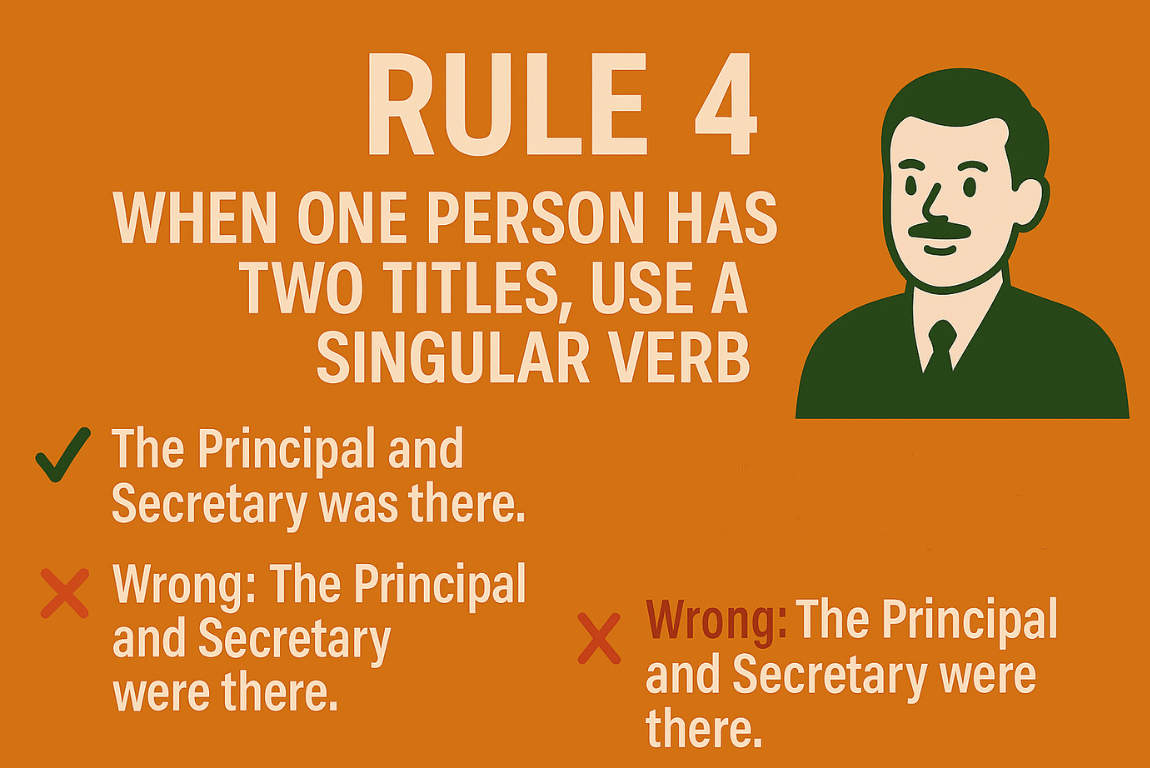
If two nouns refer to the same person and the first noun has an article (the, my, our, etc.), use a singular verb. This is one of the tricky grammar rules you must understand.
Examples:
- The Principal and Secretary was there. ✅
- My uncle and guardian has come to see me. ✅
❌ Wrong: The Principal and Secretary were there.
🔥 Quick Trick: If only one article is present before the first noun, use a singular verb.
More Examples:
- The captain and coach is addressing the team. ✅ (Same person)
- My best friend and mentor has guided me well. ✅ (Same person)
Make sure to apply these grammar rules while writing essays and answering grammar-based questions in exams.
Rule 5: When Two Different People are Mentioned, Use a Plural Verb
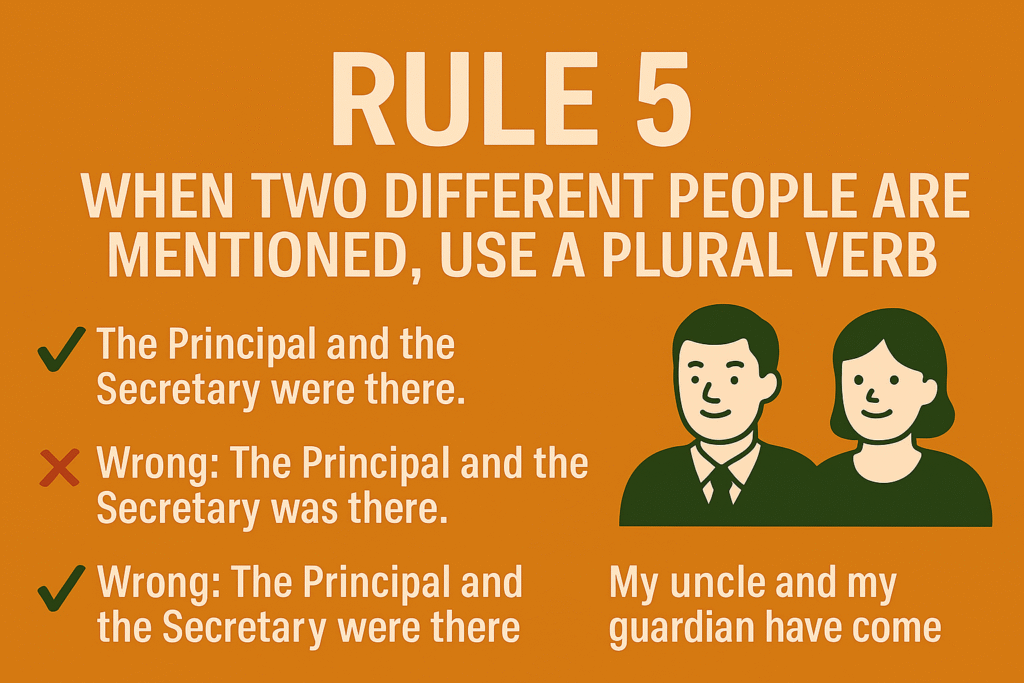
If each noun has an article or possessive adjective, we are talking about two different people, so use a plural verb. This is one of the most tested grammar rules in competitive exams.
Examples:
- The Principal and the Secretary were there. ✅
- My uncle and my guardian have come to see me. ✅
❌ Wrong: The Principal and the Secretary was there.
🎯 Golden Rule: Two articles = Two people = Plural verb.
More Examples for Clarity:
- The doctor and the nurse were discussing the case. ✅ (Two people)
- My friend and my teacher have arrived. ✅ (Two people)
By following these grammar rules, you can avoid costly mistakes in your exams.
Grammar isn’t scary—it’s just a set of weird grammar rules that you have to memorize (like Bollywood dialogues). With these 5 powerful grammar rules, you are now one step closer to cracking PSSSB, PCS, Punjab Police, Punjab Patwari, and all other competitive exams.
So, go ahead—impress the examiners, confuse your friends, and correct your relatives at family gatherings!
Summary of Key Takeaways:
- Optative Sentences use plural verbs even if the subject is singular.
- Two singular nouns joined by ‘and’ take a plural verb.
- Some word pairs act as one unit and take a singular verb.
- One person with two titles takes a singular verb.
- Two different people mentioned separately take a plural verb.
FAQs (Frequently Asked Questions)
Q1: What are grammar rules, and why are they important for competitive exams?
A: Grammar rules are the backbone of any language. They help ensure clarity and correctness in communication. In competitive exams like PSSSB, PCS, and Punjab Police, strong grammar skills can boost your score in the English section.
Q2: Why do optative sentences take plural verbs even with singular subjects?
A: Optative sentences express wishes or prayers. The verb remains plural because of an implied “may” at the beginning, even if it’s not written.
Q3: What’s the easiest way to identify if ‘and’ requires a singular or plural verb?
A: If two singular nouns joined by “and” refer to different things, use a plural verb. If they refer to one entity (like “bread and butter”), use a singular verb.
Q4: Can I use a singular verb with “and” in every case?
A: No! If “and” joins two different people or objects, use a plural verb. But if it refers to a single concept, use a singular verb.
Q5: How can I quickly determine whether a sentence requires a singular or plural verb?
A: Look at the subject! If it’s a singular noun, use a singular verb. If it’s plural or involves multiple people/things, use a plural verb.
Q6: Why do some word pairs take singular verbs while others take plural?
A: Some word pairs like “bread and butter” represent a single idea, so they take singular verbs. Others, like “gold and silver,” refer to separate things and require plural verbs.
Q7: How can I remember the exception to Rule 4 (One person, two titles)?
A: If there’s only one article (like “The Principal and Secretary”), it’s one person = singular verb. If both nouns have articles (“The Principal and the Secretary”), it’s two people = plural verb.
Q8: Can we always use ‘have’ when two singular nouns are joined by ‘and’?
A: Only if they refer to two different people or things. If it’s one entity, use “has” instead.
Q9: What’s the biggest mistake students make in subject-verb agreement?
A: Many assume that a singular subject must always take a singular verb. But context and grammar rules decide the correct verb.
Q10: How can I master these grammar rules for my exams?
A: Practice! Read examples, solve quizzes, and apply grammar rules when writing essays or speaking English.

